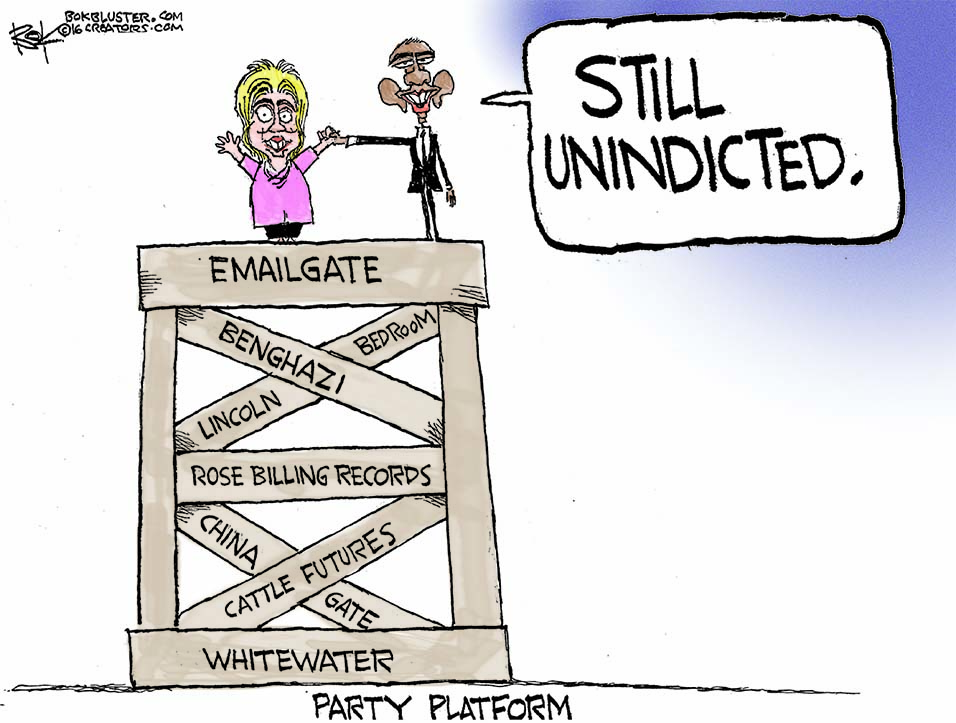by Joseph P. Tartaro | Executive Editor
There is no basis for criminal charges to be filed against presumptive Democratic presidential nominee Hillary Clinton for her use of a private email server while she was Secretary of State, FBI Director James Comey said in a special press conference on July 5.
Even so, he emphasized that Clinton and her staff were “reckless” and “extremely careless” in handling official and personal communications, Fox News reported.
Some commentators considered this a “get out of jail free” card for Clinton, and made much of the unusual meeting between Comey’s boss, US Attorney General Loretta Lynch, and Hillary’s husband, former President Bill Clinton aboard a private jet at the Phoenix airport. Lynch said later that she would not remove herself from the case, but would likely follow the FBI’s recommendations.
At his July 5 press conference to announce the FBI’s finding following a lengthy investigation of Hillary’s handling of government emails on a private server in her Chappaqua, NY, home, Comey explained further.
“Prosecutors necessarily weigh a number of factors before deciding whether to bring charges,” said Comey, noting that there are obvious considerations like the strength of the evidence and the matter of using responsible decisions.
“They also consider the context of a person’s actions and how similar situations have been handled in the past,” said Comey. “In looking back at our investigations, into the mishandling or removal of classified information, we cannot find a case that would support bringing criminal charges on these facts.”
Almost immediately after Comey signed off on prosecuting the former Secretary of State, President Obama endorsed her at a Democrat Party political rally in North Carolina.
Then, on July 7, the FBI director testified before government oversight committees of the House of Representatives in response to withering questions of many Republican Members of Congress.
The Associated Press reported that while he defended himself for how he ended the Bureau’s probe of Clinton’s email handling, he also provided new details that could prove damaging to her just weeks before she is to be named the Democrats’ presidential nominee.
Comey acknowledged under questioning that a number of key assertions that Hillary Clinton had made for months in defending her email system were contradicted by the FBI’s investigation.
He also said that she had failed to return “thousands” of work-related emails to the State Department, despite her public insistence to the contrary, and that her lawyers may have destroyed classified material that the FBI was unable to recover. He also described her handling of classified material as secretary of state as “negligent” — a legal term he avoided using when he announced previously that “no reasonable prosecutor” would bring a case against her.
Comey repeatedly suggested that someone in the federal government who had done what Hillary Clinton and her aides did would probably be subject to administrative sanctions.
Asked whether those sanctions could include firing or the loss of security clearance, Comey said that they could. While an FBI employee who mishandled classified evidence in the way that Clinton did would not be prosecuted either, he said sternly, “they would face consequences for this.”
Comey also criticized Clinton’s lawyers for their handling of her emails. He said that they had not actually read all of her emails before destroying them, as she had suggested, and that they may have deleted classified material without her knowledge.
But, in response to Republican accusations that he had employed a “double standard” to spare Hillary Clinton from criminal charges, Comey insisted that she was not given special consideration by the FBI nor held to a more lenient standard than a less prominent person would have been.
Comey’s response to questions before the House committee were widely broadcast on many cable news stations, and he suggested in reply to one congressman’s question that the American people would be delivering the final judgment in the e-mail scandal case.
Whether he meant as part of their presidential election process or by other means, he did not say.




